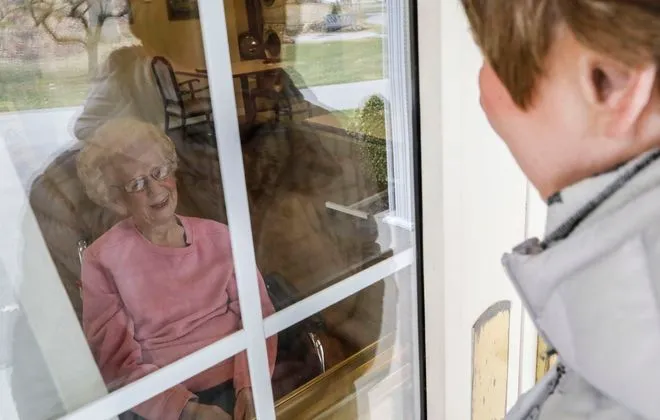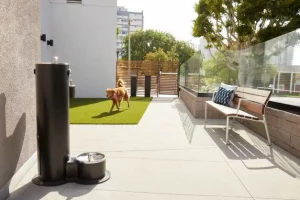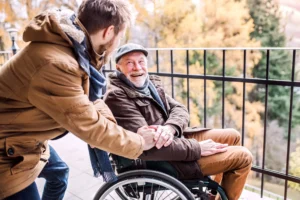Thank you for reading our blog. Things change quickly in assisted living, so please don't take this as the last word. Call us to make sure you are getting the current and best information at the best prices. Our service is provided at no cost to you. You don't need to figure it out alone. Call us at 310-853-8282.
If you are like me during the lock-down, you have assumed the role of “Superwoman,” taking care of your kids and your husband, dealing with your job, making sure the fridge is full, the bills are paid and the dog is walked. But taking care of a parent who is in a nursing home or an assisted living community is a whole other deal during the COVID-19 pandemic. You probably haven’t been able to see them since March when the federal government restricted “visitation of all visitors and non-essential health care personnel, except for end-of-life situations.”
Unable to visit, you can’t see for yourself how your loved one is doing. Is mom getting enough to eat? How are my dad’s spirits? Are my folks stable physically or in decline? Are they getting the attention they need? This is crazy-making for us women who are large and in-charge – the caretaker and nurturer for those around us whom we love.
A majority of seniors living in nursing homes or assisted living have compromised immune systems brought on by chronic health problems. More than fifty percent of them also have Alzheimer’s disease or some other form of cognitive impairment. This is one of the major factors contributing to the rapid spread of COVID-19, particularly in nursing homes, which house the most ill seniors in our community.
As a senior living placement specialist with hundreds of clients in assisted living throughout Los Angeles, I have been receiving dozens of phone calls each week from anxious and stressed-out clients who are worried about what’s going on inside their parent’s facility. This added burden of worrying about parents, on top of coronavirus related concerns regarding health, money and economic issues, can have serious effects on emotional and physical well-being. So, when I talk with clients, we talk about different tactics for keeping in touch, outlined below, but most of all, we talk about the need to keep ourselves healthy and to give ourselves a break.
6 tips for communicating with your parent in a nursing home or assisted living:
1. HAVE HEART: You need the staff to be on your side, to work as your advocate, your eyes and ears. To get what you want, you need to be empathetic to what they are going through. Almost certainly, they are downstaff and dealing with a situation that is as new to them as it is to you. So, approach the administrators, caregivers and nurses with love in your heart. Be patient if you leave a message and you don’t get a call back right away. You are one of many people they are dealing with.
2.SET A SCHEDULE: Using video conferencing can be a terrific way to communicate with your family member, but it is likely that they will need assistance from the staff on hand. If you’d like an update or to Facetime with your parent, try to set a schedule with the facility. That way the expectations are known on both sides.
3. DO NICE THINGS: We all want to feel valued and appreciated. This goes for the specialists working hard to keep your family member safe and healthy. Take a few moments to send a thank you note to the staff, buy them lunch, ask if they need equipment. Care-take the ones that are taking care of your loved one. You can catch more flies with honey than with vinegar.
4. SEND YOUR PARENT CHEERFUL NOTES AND PHOTOS: Yes, send old fashioned written cards and letters. This is a particularly good activity if you have children at home. You can teach them how to use envelopes and stamps. Besides, the post office needs us right now.
5. MAKE MUSIC: You may not be able to visit them in person, but you can send them music. Studies have shown that music is deeply rooted in our conscious and unconscious brains. Music can awaken the brain and with it, the rich trove of memories that are associated with familiar songs or beloved pieces. If you have some time right now, buy an iPod and headphones from Amazon, make an iTunes playlist of your parent’s favorite tunes, and drop it off wherever your parent is living.
6. USE WINDOW VISITS OR DRIVE-BYS SPARINGLY: Saying hello through a window or from a driveway can provide great reassurance for your parent if she is cognitively alert but can be confusing for someone with Alzheimer’s or other type of dementia. A person with cognitive impairment may be unable to process or retain the reasons you are not able to come in. Instead of being a positive experience, it can be upsetting. Before you do a drive-by visit, make sure your mom or dad has the capacity to understand why you are not coming inside.
This is a long-distance race not a sprint, a situation that is going to impact you and the elders in your life for many months to come. The reality is that there are things beyond our control right now. You need to take a deep breath, do some self-care and settle in for the long haul. There is only so much you can do.
Remember you are awesome. Whether you are a daughter,granddaughter, sister or friend, your caring is a gift. So many older adults have no one to worry about them. Your loved one is lucky to have you. The best thing you can do is stay healthy yourself so that you can continue to be there for your parent and all those who love you.
Assisted Living Locators Los Angeles owner Sarah Ordover is one of LA’s top senior living advisors. Certified in dementia care, Sarah is a trained aging specialist who holds an RCFE assisted living administrators license. Sarah thoughtfully guides families through the senior living decision-making process, helping them find the best solution for their loved ones. Call Sarah at 310-853-8282 for a consultation. Assisted Living Locators is free to clients.




